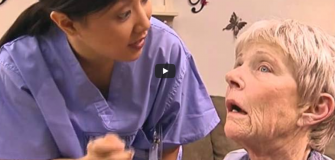[vc_row][vc_column][vc_column_text]More than 342,000 Australians are living with dementia—this number is expected to increase by 400,000 in 10 years. On a global scale, at least 44 million people are living with dementia, making the disease a global health crisis that must be addressed.
Alzheimer’s is life-changing for the person with the disease, as well as their family and friends, but information and support are available. No one has to face Alzheimer’s disease or other dementia on their own.
What causes Alzheimer’s?
Alzheimer’s is caused by plaque deposits that develop in brain tissue that become toxic to brain cells. One of the major hurdles to finding a cure for the disease is that it’s impossible to clear out the deposits from the tissue. So scientists have turned their attention to early detection and prevention.
A Scientific Breakthrough
Last January 2019, United Neuroscience, a biotech company founded by Yi, her daughter Mei Mei Hu, and son-in-law, Louis Reese, announced the first results from a clinical trial on UB-311 an Alzheimer’s vaccine.
This vaccine has synthetic versions of amino acid chains that trigger antibodies to attack Alzheimer’s protein the blood. Wang’s vaccine is a significant improvement over previous trials because it can attack Alzheimer’s protein without creating any negative side effects.
“We were able to generate some antibodies in all patients, which is unusual for vaccines,” Yi told Wired. “We’re talking about almost a 100 percent response rate. So far, we have seen an improvement in three out of three measurements of cognitive performance for patients with mild Alzheimer’s disease.”
The researchers also claim it can delay the start of the disease by five years. While this would be a miracle for people with the disease and their families, according to Elle, it could also save the healthcare industry by more than $220 billion.
“You’d want to see larger numbers, but this looks like a beneficial treatment,” James Brown, director of the Aston University Research Centre for Healthy Ageing, told Wired. “This looks like a silver bullet that can arrest or improve symptoms and, if it passes the next phase, it could be the best chance we’ve got.”
“A word of caution is that it’s a small study,” says Drew Holzapfel, acting president of the nonprofit UsAgainstAlzheimer’s, said according to Elle. “But the initial data is compelling.”
The company is now working on its next clinical trial of the vaccine and while hopes are high, so is the pressure. The company has already invested $100 million developing its vaccine platform. According to Reese, the company’s ultimate goal is to create a host of vaccines that will be administered to protect people from chronic illness.
“We have a 50-year vision – to immuno-sculpt people against chronic illness and chronic aging with vaccines as prolific as vaccines for infectious diseases,” he told Elle.
Sources:
- https://www.alz.org/au/dementia-alzheimers-australia.asp
- https://www.upworthy.com/a-mother-and-daughter-team-have-developed-what-may-be-the-worlds-first-alzheimers-vaccine
[/vc_column_text][/vc_column][/vc_row]





























